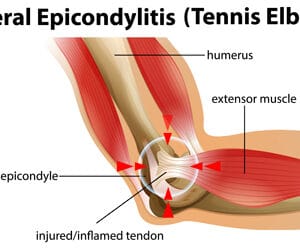The elbow is a complex joint made up of three bones: the humerus, ulna and radius. There are many muscles that surround the elbow joint that allow you to bend, straighten and rotate your hand and forearm. Individuals may experience elbow pain after a specific incident or symptoms may develop gradually.
Some common injuries at this joint include:
- Radial head fracture
- Lateral epicondylalgia
- Cubital tunnel syndrome
A radial head fracture usually occurs when an individual falls on an outstretched hand. This instinct to break the fall with your hands causes the force to travel up the forearm and fracture the radius very close to the elbow joint. Symptoms may include pain and swelling on the outside of the elbow, difficulty bending or straightening the elbow or an inability to turn your hand face down. Depending on the severity of the fracture, treatment may include surgery or splinting.
Lateral epicondylalgia, also known as tennis elbow, is characterized by pain that has a gradual onset and occurs due to repetitive overuse of the wrist extensor muscles. Individuals may experience weakness in the hand during gripping or lifting activities as well as pain on the outside of the elbow.
Cubital tunnel syndrome is an irritation of the ulnar nerve as it travels on the inside aspect of the elbow down to the hand. The ulnar nerve can become compressed in this region from direct trauma to the elbow, repetitive elbow movements, overhead activities or joint inflammation. When the ulnar nerve is compressed, symptoms present as pain and numbness on the elbow and fourth and fifth fingers.
Physiotherapy treatment for these injuries may include:
- Activity modification
- Manual therapy to regain full range of motion of the elbow
- Stretching of muscles around the elbow joint
- Strengthening of forearm muscles
- Electrotherapy modalities
These injuries as well as many other causes of elbow pain can be successfully managed through physiotherapy. A consultation with your physiotherapist can help identify your area of injury and tailor an appropriate treatment plan specifically for you. Book an appointment here.




